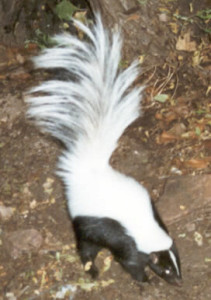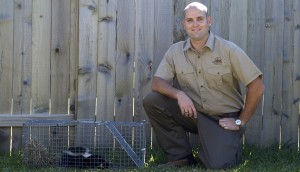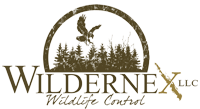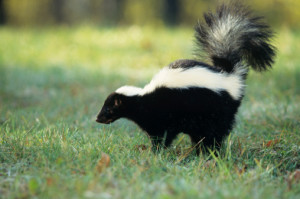Skunk Removal
Skunk removal is ALWAYS best handled by the experts at Wildernex Wildlife Control. Skunks are small mammals with a thick coat of fur, most commonly known for their ability to spray their fowl odor from their anal glands when attacked or threatened. Contrary to many beliefs, skunks do not spray a mist but rather a direct spray with precise accuracy. They are able to hit targets more than ten feet away. The chemical compounds of their spray does not only smell bad and prove difficult to remove from skin, clothing, and pets, but can also cause temporary blindness.
Skunks are omnivorous, feeding on both plants and animals. Their main diet consists of insects and larvae, earthworms, grubs, small rodents, lizards, frogs, snakes, birds, moles, and eggs. They will also feed on berries, roots, leaves, grasses, fungi, and nuts. If you see digging in your flowerbeds or lawn, one of the common culprits aside from armadillos are usually skunks that dig for grubs and worms in the rich moist soils of  lawns and manicured landscapes. In urban settings, skunks may also take opportunities to feed on human garbage or accessible dog food or cat food.
lawns and manicured landscapes. In urban settings, skunks may also take opportunities to feed on human garbage or accessible dog food or cat food.
Skunks are not true hibernators during the winter months; instead they will often go into a state of torpor which is a dormant state of inactivity that will only last for a few days or weeks. During these winter naps, females are known to den with as many as 12 other females, while males often den alone. These dens are commonly found under decks, homes, offices, or storage sheds in urban areas. Burrows under homes can cause erosions, dirt cave-ins, and can ultimately affect the structural stability of homes or foundations.
Skunks can carry and transmit many diseases; the most feared being the rabies virus. In the United States, skunks rank just behind raccoons as the most common carrier of rabies. Rabies in Texas is an ongoing state health emergency. Therefore, according to the Rabies Control and Eradication Administrative Code (Chapter 169. Administrative Code) Rules of the Board of Health for the Rabies Control Act (Chapter 826. Texas Health and Safety Code), it is illegal for a person to transport certain animals that are high risk for transmitting rabies, including coyotes, species of foxes indigenous to North America, and raccoons, to, from, or within the state. A violation of this law is a Class C  misdemeanor. For this reason it is imperative that a licensed wildlife biologist at Wildernex handle all necessary skunk removal and skunk control on your property.
misdemeanor. For this reason it is imperative that a licensed wildlife biologist at Wildernex handle all necessary skunk removal and skunk control on your property.
Have questions about wildlife control? Check out our FAQ page or contact us for your answers!
Wildernex Wildlife Control offers Skunk Removal in Houston, Austin, Dallas Fort Worth, and San Antonio!

